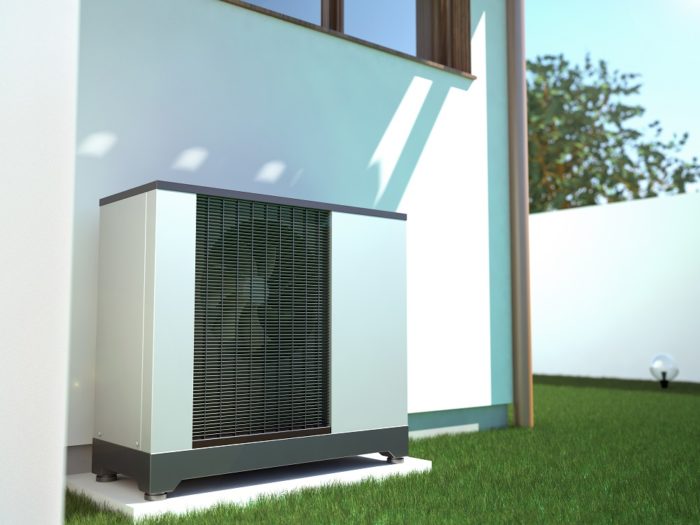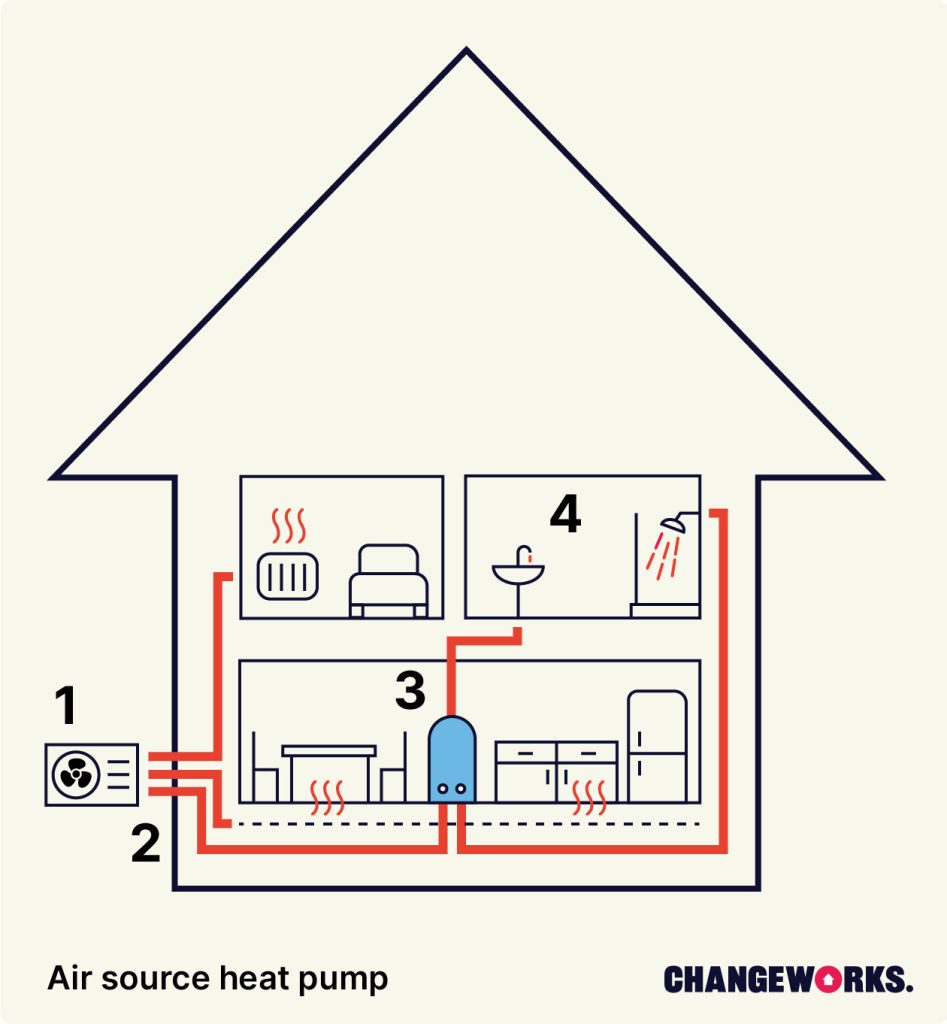Air source heat pump
An air source heat pump is a renewable type of central heating system. It does the same job as a boiler but uses the outside air instead of oil or gas. Depending on the kind of heat pump you choose, it can also take care of a household’s hot water needs.

Since heating and hot water make up around 70% of our home energy usage, at Changeworks we see heat pumps as having a big part to play in Scotland’s net zero mission.
Although heat pumps have been around for a while, they’re still quite a misunderstood technology. This guide should clear up the confusion.

1. Heat from outside enters air source heat pump
2. Compressor and condenser heat up water in pipes
3. Heated water flows to radiators, underfloor heating, and hot water cylinder
4. Water from hot water cylinder can be used for bath, shower and taps
FAQs
Air source heat pumps are a renewable energy technology designed to replace traditional heating systems.
They look like air conditioning units and are positioned outside of the property. They operate like a refrigerator, but in reverse. Heat from the air is absorbed at low temperature into a fluid. This fluid passes through a compressor, increasing the temperature, which is then used to heat water for use in your home.
Air source heat pumps require electricity to operate but as they extract natural heat from the air, they have lower running costs and environmental impact than electric, oil and solid fuel heating systems. This makes them particularly suitable for off gas properties.
During winter, your air source heat pump may need to be on constantly to heat your home efficiently. You will notice that radiators will not feel as hot to the touch as they might do when using a gas or oil boiler, but your home will feel warm and comfortable all winter. A heat pump will continue to generate heat from the outside air even when the temperature is as low as -15C.
Unlike gas and oil boilers, heat pumps deliver heat at lower temperatures over much longer periods. You may have to install larger radiators to make the most of the central heating system, however the appointed contractor will advise you fully.
There are both financial and environmental advantages to installing an air source heat pump in your home.
Air source heat pumps provide more efficient heating than oil, LPG or electric heating systems, resulting in lower carbon emissions. For every unit of electricity consumed by an air source heat pump, approximately three units of heat are produced.
Air source heat pumps provide the biggest benefit to well insulated, off gas properties. Lower fuel bills can be expected, especially if you are replacing conventional electric heating. Running costs can potentially be higher when compared to new, efficient gas boilers. However, savings are still possible if replacing older and more inefficient gas boilers.
You can view case studies and examples of homeowners in Scotland who have installed an air source heat pump on the Green Home Network.
Typically heat pumps use less energy than a traditional heating system such as electric storage heaters. For example, if you buy one unit of electricity this will be turned into one unit of heat energy by a storage heater.
With an air source heat pump, every unit of electricity used will produce approximately three units of heat energy in return, making it three times more efficient than storage heating.
Air source heat pumps are comparatively cheaper to run than older oil, gas and electric storage heater systems. However, they can be more expensive to run than new, more efficient gas and oil boilers.
| Existing System | Fuel Bill Saving (per year)
(Negative figures indicate an increase in bills) |
|
| Gas Boilers | Old (G-rated) | £395 to £425 |
| New (A-rated) | -£95 to -£100 | |
| Electric Storage Heaters | Old system | £920 to £1,000 |
| New system | £520 to £560 | |
| Oil Boilers | Old (G-rated) | £500 to £550 |
| New (A-rated) | -£80 | |
| LPG Boilers | Old (G-rated) | £1,200 to £1,300 |
| New (A-rated) | £380 to £410 | |
| Coal | £315 to £350 | £315 to £350 |
Figures are based fuel prices as of April 2020.
You can read more about running cost comparisons on the Energy Savings Trust website.
If you own your property, you may be asked to contribute towards the cost of the air source heat pump installation. Any contribution that may be required would depend on the level of grant funding you are entitled to.
If you rent your property privately the decision to take part in the project lies with your landlord. The level of funding available to private landlords is dependent on their personal circumstances.
If you rent your property through the local authority or housing association you will not need to pay anything towards the installation or maintenance of the heat pump, you will just pay your energy bills as usual.
We would encourage anyone interested to arrange a free, no obligation survey to establish the total cost of the project by calling Home Energy Scotland on 0808 808 2282. Home Energy Scotland can also provide details on the interest free loan available from the Scottish Government to help you pay your share of the cost.
Local Authorities are awarded grant funding from the Scottish Governments Energy Efficiency Scotland: Area Based Schemes (EES ABS). This grant funding is available to support private householders improve the energy efficiency of their homes. The funding available allows us to offer these measures at a substantially reduced cost.
The domestic Renewable Heat Incentive Scheme (RHI) is now closed. It closed to new applicants on 31 March 2022.
Once you have decided to proceed with the project you will enter into a contract with the appointed contractor for the works to be carried out to your home. The work will be scheduled, and notification provided in writing. If you rent your home from a Local Authority or a Housing Association, your home may automatically be included, this will be confirmed by your landlord.
The contractor will discuss with you the installation process including the positioning of the air source heat pump and the level of disruption to expect. Installation will take up to 5 days to complete, depending on your current heating system. You may have to carry out some minor preparation for the installation such as moving personal belongings. The contractor will be able to advise you fully following the technical survey of your property.
Installation is likely to require access to all rooms in the property and does involve some activity such as drilling, so unfortunately there will be some noise and disruption. The contractor will take care to minimise any inconvenience and tidy up at the end of each day. Pets may find the noise distressing, so please be aware, and always keep them supervised.
Air source heat pumps operate at lower temperatures than alternative ‘wet’ central heating systems. For this reason, they require distribution systems with a larger area such as under floor heating or larger radiators.
If you have radiators already it is likely these will need to be replaced with larger models. The appointed contractor will carry out a free, no obligation survey and discuss specific details of an installation in your home including whether new radiators will need to be installed.
As part of this project, Changeworks Quality Assurance team will commence inspection activity after the project begins to ensure work has been carried out to appropriate standard and to the approved specification.
No, installing a heat pump does not require a building warrant.
With regular scheduled maintenance you can expect an air source heat pump to operate for 20 years or more.
Air source heat pumps require maintenance like any other central heating system to ensure it remains safe and operates efficiently. Some maintenance is straight forward and can be carried out by the householder, but other maintenance should be done by a professional. Typical maintenance includes:
- A yearly check that the air inlet grill and evaporator are free of leaves or other debris.
- Detailed check by a professional installer every year.
- Removal of any plants that have started to grow around the heat pump.
- Check the central heating pressure gauge in your house from time to time. You will be shown how to do this by the contractor.
- Use anti-freeze in colder weather to prevent the heat pump from freezing. Levels of anti-freeze and its concentration vary but this will be explained to you by the contractor.
The contractor is responsible for the reactive repair of your new central heating system for 12 months following your installation. During this period, you should report any defect or breakdowns to the contractor.
Your heat pump will also be covered by a warranty, details of which will be provided by the contractor.
A small amount of noise is produced from the fan within an air source heat pump while it is in operation. The noise is minimal though and should not be disruptive. The air source heat pumps fitted in this project have been specifically designed for UK residential use with sound pressure levels of around 45dB(A). For comparison, a typical library has a sound pressure level of 40dB(A) and a room conversation comes in at around 60 dB(A).
An air source heat pump requires electricity to operate so a power cut would result in a temporary loss of heating and hot water. This would happen with any heating systems which use electricity to generate heat and even some systems like gas and oil which require electricity to spark combustion.
Unless you live in an area which is prone to regular disruption of electrical supply this is not likely to be an issue.
There is no requirement to change your tariff or electricity provider once your heat pump has been installed. However, if you currently have storage heaters that use on and off peak tariffs at different times you may wish to seek advice and speak to your energy supplier. You may benefit from talking to our advisors in Home Energy Scotland to check you are on the correct tariff to meet your needs.
If you are on a pre-payment meter for your electricity supply, there is a risk your bills could increase significantly after installing an air source heat pump. Home Energy Scotland can offer free impartial advice by calling 0808 808 2282.
It is important to us that the householder benefits from their new air source heat pump. To monitor this, Changeworks will ask all householders to give details on their energy usage and to complete a survey before and after work. We will also ask a proportion of householders to allow us to install temperature and humidity monitors in their property.
After the project ends, all householders will be offered advice on how to make the most of their new heating system.
During the work, the contractor will be your main point of contact. A Resident Liaison Officer will be appointed, and contact details given to you.
As part of this project the appointed contractor will prepare a pre and post install EPC and a copy of the report will be made available to you. Please note that if you are a council or housing association tenant the report will be provided to them in the first instance.
Have a chat with an energy advisor at Home Energy Scotland on 0808 808 2282 for advice on ways to save energy and money in your home.